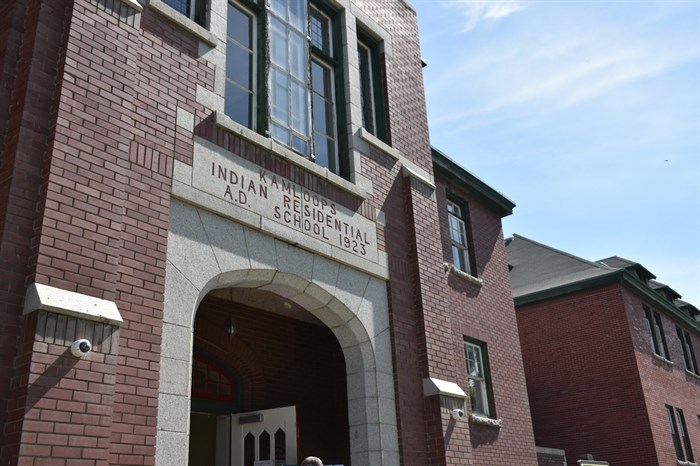
When 215 children were found to be buried near the former Kamloops Residential School, poet and residential school survivor Dennis Saddleman steeled himself to go and honour the victims, and support his family and friends.
(LEVI LANDRY / iNFOnews.ca)
June 01, 2021 - 7:30 AM
Dennis Saddleman, the Word Warrior, was transported back to his school days when he arrived at Tk’emlups on Friday.
Saddleman took part in a ceremony at the powwow arbor on Friday, May 28. As a residential school survivor and former student for 11 years, he was reminded of the students he once knew.
“I went to the arbor and listened to the people praying and speaking. Later on, they told all the survivors to sit in a circle and all the drummers and singers sat behind us,” Saddleman said. “I felt my emotions and the drums and the sadness. Tears welled up in my eyes. I was thinking, ‘I survived that school, but maybe if I didn't survive, I could've been one of those kids too.’”
When the announcement came of 215 children found buried at the former Kamloops Residential School, it was shocking and prompted swift responses from government officials and church leaders.
READ MORE: Syilx Okanagan Nation calls on provincial and federal governments to directly address atrocities of Kamloops Indian Residential School
However, at the site, it was important for the Secwepemc community to pause investigations and searches to honour the children and offer counselling support to those who were triggered by the findings.
“When I was feeling all the sadness, my whole body was shaken up. My brain was telling me, ‘Here we go again,’” he said. “I was thinking about my courage and my strength and my healing. I’ve gone this far. There's a lot of survivors that would not share their stories... I've got to keep myself together. Do not break the pieces.”
Saddleman went through a long, dark period of his life, he said. For fifteen years after attending the school, he fell deeper into alcohol and drug abuse, blaming his parents for putting him through the school where he faced physical and sexual abuse.
He remembered stumbling along sidewalks — barely eating and saving nickels for alcohol — and suicide attempts.
“The anger, the shame, the hate, the violence was so deep inside me. I tried to get rid of it so I stabbed myself with a hunting knife on the right side of my rib cage,” he recalled.
READ MORE: Michelle Good on why Indigenous people can't 'get over' residential school trauma
But that was years past. Just recently, the poet celebrated 41 years of sobriety and still continues his “healing journey.”
In later years, Saddleman learned that his parents didn’t choose to send him to the residential school. He eventually came to learn that his parents could have been sent to prison for keeping their child at home.
“I went to their grave and said I was sorry,” he said.
In the years since, Saddleman has given talks at schools across B.C., from elementary level up to university. He also led a theatre group that performed at major centres across the country, and even flew to perform in Honolulu.
One of his most powerful pieces, however, is his poem Monster. A work that he read aloud at a Truth and Reconciliation Commission hearing at Moccasin Square Gardens in 2013.
An audio clip of the reading can be found here, or read the poem here.
When Saddleman dedicated himself to sobriety, he found that writing provided him with the tools to cope and to help others do the same. Years after leaving the residential school and after becoming sober, Saddleman upgraded his high school classes and then attended Penticton’s En’owkin Centre to pursue a career as a writer.
“I wrote about my dark life and residential school. I earned the name 'Word Warrior.' That’s who I am today,” Saddleman said.
He continues to write in hopes that his work can help others come to terms with their trauma.
“Instead of all this racism and discrimination, we must understand each other. Once we can do that we can be together as one nation, one people,” he said.
READ MORE: Kamloops woman recalls how family was fractured by residential school system
To contact a reporter for this story, email Levi Landry or call 250-819-3723 or email the editor. You can also submit photos, videos or news tips to the newsroom and be entered to win a monthly prize draw.
We welcome your comments and opinions on our stories but play nice. We won't censor or delete comments unless they contain off-topic statements or links, unnecessary vulgarity, false facts, spam or obviously fake profiles. If you have any concerns about what you see in comments, email the editor in the link above.
News from © iNFOnews, 2021